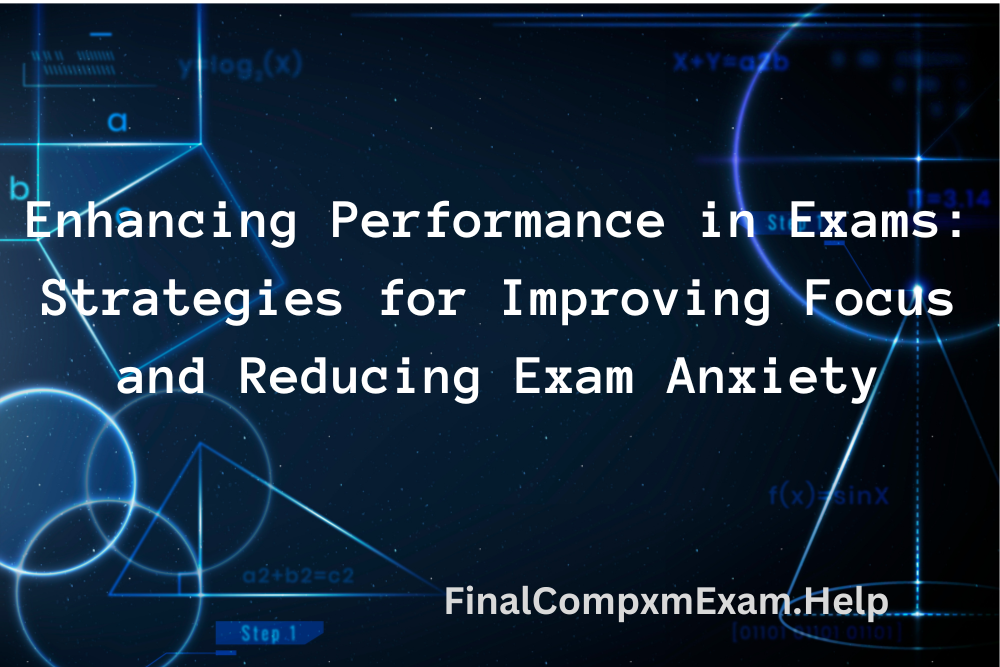
New Customer Offer
Get your first capstone paper (upto 3 pages) written in just $5 dollars

Get your first capstone paper (upto 3 pages) written in just $5 dollars
Posted By Admin @ 17/03/24

It might study how mindfulness training improves focus, memory, and academic performance. The article might also offer practical advice on introducing mindfulness into students' study regimens, including guided mindfulness exercises for exams. This topic promotes academic performance and student well-being by improving stress management and mental resilience.
Exam anxiety—apprehension, anxiousness, and stress before or during exams—can affect students' performance and well-being. Fear of failure, self-criticism, and academic pressure feed this phenomenon. Students may have racing thoughts, trouble concentrating, quick heartbeat, and sweaty hands, which can impair attention and memory. Exam anxiety is often caused by perfectionism, lack of preparation, unpleasant experiences, and peer comparison. Understanding exam anxiety's causes and symptoms is essential to managing and reducing its effects on academic achievement.
Reviewing prior tests or quizzes might reveal the format, question kinds, and focus. To evaluate your preparation, answer questions under exam conditions. Find patterns or themes in the questions to examine. Please contact your instructor, lecturer, or classmates about any perplexing issues. Visit your instructor's office hours for specialized assistance or idea clarification. Forums, discussion boards, and instructional websites can provide more explanations and examples.
Academic success, especially during exams, depends on focus. Focus improves information processing, memory retention, and problem-solving, enhancing performance. External (noise, technological gadgets) and internal (wandering thoughts, anxieties) distractions can impair focus and learning. Creating a distraction-free study environment, using time management strategies like the Pomodoro Technique or time-blocking, and practicing mindfulness through mindful breathing and meditation can improve attention and test preparation.
Focus and exam preparation may be improved with several methods. The Pomodoro Technique maximizes productivity and prevents fatigue by splitting study sessions into focused work intervals followed by brief breaks. Setting up study tools, minimizing distractions, and making the workspace pleasant produces an excellent study atmosphere. Meditation and mindful breathing boost awareness, attention, and stress reduction. Summarizing, paraphrasing, and teaching encourage longer focus and retention, improving understanding and retention. Long study periods require breaks and exercise to stay focused.
Exam anxiety may be controlled using cognitive-behavioral methods, relaxation, stress management, and a growth attitude. Cognitive restructuring entails questioning negative exam beliefs and replacing them with balanced and realistic ones. Progressive muscular relaxation and deep breathing can reduce physical tension and ease self-doubt, while positive self-talk can enhance confidence. Time management, social support, and enjoyable hobbies can minimize stress and boost resistance to academic challenges. A growth mindset entails seeing problems as learning opportunities, accepting setbacks, and being kind to yourself.
Optimizing exam preparation and performance requires incorporating attention and anxiety management into a tailored study strategy. By evaluating strengths and limitations, students may customize techniques to their requirements. Regular and proactive use of these tactics can reduce exam anxiety and improve attention. Long-term success requires prioritizing self-care and balancing academic and personal responsibilities. Professional support, such as counseling, academic support, or teacher or mentor consultations, can help manage test stress and improve performance. Students can develop the resilience and abilities needed to succeed in tough academic situations by prioritizing academic accomplishment and mental well-being throughout exam preparation.
Prioritize subjects by significance or comprehension. Start with the hardest parts. Make notes simpler to read using headings, subheadings, and bullet points. Try active learning: Write a summary or use concept maps to show links between ideas. Pass the content on to a friend, family member, or study group member. Make flashcards for crucial words, definitions, calculations, etc.
Think positively about your academics and believe you can achieve. Keep motivated by celebrating little wins and development milestones. Self-care and stress management can lower anxiety and help you balance school and other activities. These specific tactics will help you prepare for tests and quizzes and succeed academically by adapting to your learning style. Remember to change your study method depending on practice sessions and your individual experiences.
A multimodal approach that addresses attention and test anxiety is needed to improve exam performance. This approach requires understanding exam anxiety, developing good study strategies, and managing anxiety. Students can maximize test preparation and performance by incorporating these methods into a tailored study strategy and prioritizing self-care. Success depends on a positive outlook and a healthy balance between academics and well-being. We need more study to understand how to improve exam performance and student achievement.
